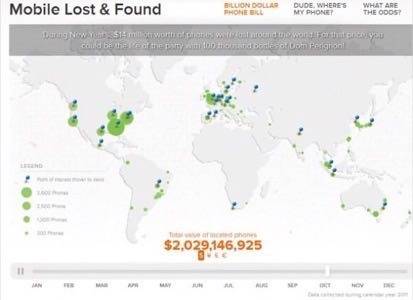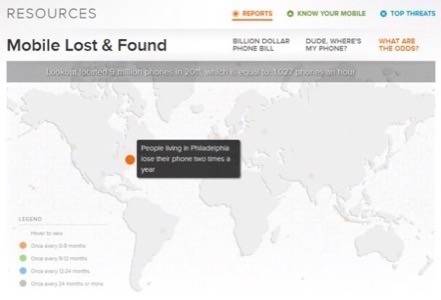We’ve all done it. You step out on the street after paying for your coffee at Starbucks or handing the cab driver a tip. Your first natural inclination is to reach in to your pocket, dig out your cellphone and call somebody and say, “hey, I’m on my way.” But your phone is not there.

Damn it.
Mobile security firm Lookout estimates that $30 billion worth of smartphones are lost every year in the United States. Sometimes those phones are found, many times they are not. Losing your phone is one of the most stressful events a person in a consumers’ day-to-day life. Many people rely on their smartphones for everything, from directions to contacts to pictures of their puppies and babies. It is an intensely personal device. If you have lost your phone, in many ways, you have lost yourself.
In a new website launched today, Lookout takes a look at the lost phone conundrum. While Lookout user base is mostly U.S focused and Android-based, it still tracks $7 million in lost devices daily. Over the course of the year, Lookout located 9 million in 2011, or about one device every 3.5 seconds.

It is important to note that Lookout located these phones. That does not mean they were actually found. The sad reality is that once a phone is lost, the longer it takes you to find it, the likelier it is gone forever. Kind of like a missing persons case. I once used “find my phone” software to try and locate my device after a heavy night of drinking and could not find it, only to realize about three days later that it was in my couch cushions.
In the U.S. the most likely city to lose your phone is Philadelphia. Having spent significant time in Philly over the years, I can understand this. Mostly, I would lose almost all of my possessions just to escape being in Philly. Philadelphians are three times more likely to lose their phones than New Yorkers or San Franciscans who, in turn, are three times more likely to lose their phones than Chicagoans.

Philadelphians also lose their phones in weird places. For instance, the No. 1 place to lose your phone in Philly is the automotive shop, according to Lookout. A pizza place, church and an apartment were the next most likely places. In New York, phones were lost most often at a fast food restaurant, followed by coffee shops and apartments. It will come as a surprise to no one that San Franciscans lose their phones most often at coffee shops or at the office.
Phones are lost most often at night, particularly between the hours of 9 p.m. and 2 a.m. There could be a variety of reasons for this. It has been a long day and you are tired, not keeping track of your device. Or, you lost it earlier in the day and are just figuring out that it is not on your person. You may be working late at the office or the coffee shop and are in a rush to get out and go home.
Or, to the pub.
Drunk people lose stuff. This is a basic tenet of modern society. The most common place to lose your phone in London is at the pub. To be honest, this is where I tend to lose my device most often. I have left it sitting on the bar or at the table when with a group of friends. I have even left my phone at my local pub on purpose, trusting my local bartender buddies to keep me from drunk dialing ex-girlfriends. You would be surprised how well this works.

Lookout located $2.5 billion worth of devices in 2011, mostly Android and mostly in the U.S. That number was reached by averaging about $250 per device, which is pretty close to the cost of buying a new Android (after taxes and accessories etc.)
One interesting note that may have a correlation is that some cities that have the FBI’s highest crime rates were also in Lookout’s top 10 for lost phones. That includes Cleveland, Detroit, Oakland and Newark. While Lookout just processes the data and does not make the statement that “your phone is more likely to be stolen in this city,” it is interesting to note.
Not included in Lookout’s numbers are the psychological or enterprise toll that losing your phone has on an individual. For enterprise workers that lose there phones, the cost can be enormous. Trade secrets, contacts lists, access to company infrastructure are all concerns that IT departments have with workers who lose their phones. There is also the human cost for enterprises that must have IT guys set up device and application management software through companies like Apperian, App47, 3LM, Research In Motion, Symantec, Good Technology and a variety of others.
Do yourself, you business and your smartphone a favor. Do not lose your device. Use device tracking software through iOS or a variety of third-party applications to keep track of where it might be. Next time you reach into your pocket and find it empty, you will be glad you did.
Correction: The original headline of this article said Lookout predicts Americans lose $30 million in devices a year. The correct number is $30 billion.
Top and bottom images courtesy of Shutterstock

















